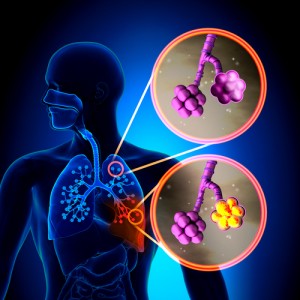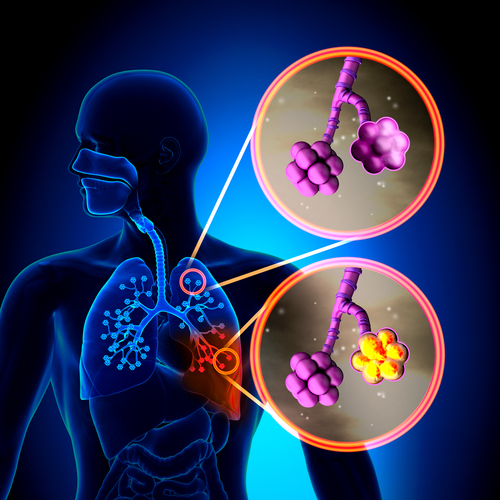 As indicated by the name, community-acquired pneumonia (CAP) is an infectious (communicable) disease spread by bacterial pathogens such as Pseudomonas aeruginosa and Streptococcus pneumoniae. Patients with chronic obstructive pulmonary disease (COPD) seem to be at a higher risk for CAP, as it is one of the most common infections among patients and affects 10% of COPD patients over 40 years old. The disease often requires hospitalization and results in death in underdeveloped countries.
As indicated by the name, community-acquired pneumonia (CAP) is an infectious (communicable) disease spread by bacterial pathogens such as Pseudomonas aeruginosa and Streptococcus pneumoniae. Patients with chronic obstructive pulmonary disease (COPD) seem to be at a higher risk for CAP, as it is one of the most common infections among patients and affects 10% of COPD patients over 40 years old. The disease often requires hospitalization and results in death in underdeveloped countries.
Interestingly, CAP in the general population and CAP in patients with COPD can be different. According to “Clinical Features, Etiology and Outcomes of Community-Acquired Pneumonia in Patients with Chronic Obstructive Pulmonary Disease,” published on NCBI, COPD patients are more commonly infected by P. aeruginosa. Infection is associated with low forced expiratory volume in one second (FEV1) and a poorer treatment outcome.
Findings were made by evaluating 4,121 episodes of CAP, with 983 (24%) of these episodes occurring in patients with COPD. Some patients had been receiving chronic oxygen therapy at home or were taking inhaled steroid medication before administration to a university hospital. Once a day, at least one of the clinical researchers evaluated the patients and recorded clinical data in a computer-associated protocol.
From these results, it was suggested a pneumococcal vaccine would have a benefit on patient outcome. There was a protective effect from the vaccine, with a goodness-of-fit of 0.908 for the model. The vaccine could be important to COPD patients at a higher risk for mortality following CAP. A vaccine might also have a benefit in reducing the incidence of bronchiectasis, which is enhanced by pseudomonas infection.

